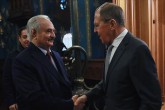Why do ghosts play such an important role in our perception of fear? It is true some claim encounters with them and others are willing to follow them, but not many in the world have actually seen them. However, the idea of possibly seeing a ghost is scary enough to inspire goosebumps for billions of people around the world. Perhaps what scares us the most is that they are not physical beings. Sometimes the stories of people seeing them are scary enough to traumatize us or inspire nightmares at night. Those stories can haunt us. Every time we are alone at home and every time there is a power outage, the memories of these stories come rushing back. Those ghosts know when to haunt us. There are no easy fixes and no “Ghostbusters” to call to help us. In a TV commercial in the movie “Ghostbusters,” Dr. Stantz, Spengler and Venkman ask the audience to call their number for any “supernatural elimination needs.” Considering that stories of those who see ghosts may not be quite believable, they often say, “We’re ready to believe you.” It sounds like a simple marketing sentence, but it is, in fact, the first step to help those being haunted by ghosts.
There are also ghosts lingering in foreign and national security policies worldwide. The U.S. had a few of them. While approaching these issues maybe we should first be ready to understand the roots of the phenomenon. Ghosts, in the form of residual elements, may have a serious impact on the foreign policies of countries. They may haunt presidents in their handling of foreign and national security affairs. We may sometimes name them traumas and syndromes. The Vietnam War is one of these ghosts. Nobody in the U.S. wants to see another Vietnam War in their lifetime. There were mistakes in planning the war. There were miscalculations in implementing those problematic plans.
Likewise, there is a lack of planning for the potential domestic and international outcomes of most wars. As a result, wars and their lasting effects stretch on almost indefinitely. In its aftermath, the Vietnam syndrome constrained U.S. policymakers. The American public lost trust in policymakers in Washington, D.C., and policymakers did not want to be part of another conflict. Since then, the ghosts of the Vietnam War have remained vivid for the policymakers. Those who engaged in decision-making mechanisms during this war wrote books and made many speeches to deal with this “ghost.” After several decades there is still no end in sight and historical analogies continue to relate the Vietnam War to other military interventions by the U.S.
After the Gulf War, many considered the easy and decisive victory in liberating Kuwait as the end of the Vietnam syndrome in U.S. foreign policy. It was as if an exorcist had kicked the ghost out of the psyche of foreign policymakers. Every conflict at the end of the day did not need to be another Vietnam War. Contrary to expectations, the first invasion of Iraq did not lead to an unending, long war for the U.S. Iraqi forces left Kuwait quickly and a cease-fire was agreed upon by the warring parties.
However, the ghost made a comeback with the second invasion of Iraq. With the U.S. bogged down with the war in Iraq for more than 10 years, many started using the Vietnam analogy about the trajectory of the war. Shortly after the first battle, the American public understood that there were problems in the main rationale of the war and more importantly, it was revealed that there was actually no exit strategy. With the emergence of the Sunni insurgency and the civil war, the war became another long and unending conflict for the U.S.
The ghost was back and it started to haunt all the presidents and presidential candidates in the aftermath of Iraq. Those who voted yes for the Iraq War tried to erase this vote from their records. President Barack Obama, when elected, showed that his only credibility in foreign policy was his lack of a “yes” vote.
Later we learned that his vote did not rescue him from the ghost of the Iraq War. Just like former President Bill Clinton, who stood by while genocide was taking place in Rwanda in order to avoid a confrontation, Obama also stood by while a massacre was taking place in Syria. For those who criticized his decisions about Syria, he always reiterated the lingering issues of the Iraq War. Later President Donald Trump also demonstrated a similar position and during his presidential campaign, he attacked all of his rivals through their decisions in the Iraq War.
They were not the only ghosts for U.S. foreign policymakers. When the Benghazi attack took place on Sept. 11, 2012, the Obama administration did not know that it would lead to a major issue for them. At the end of the day, Obama was extremely cautious not to engage in long and unending wars and preferred to “lead from behind” when the Arab Spring spread to Libya. This support was critical for the Libyan opposition to overthrow the Muammar Qaddafi regime.
However, soon after the situation got more complicated and an attack on the U.S. Embassy resulted in the killing of a U.S. ambassador. In the aftermath of this attack, there were investigations and hearings in Congress in regard to this attack, which put the Obama administration in an extremely tight spot.
Obama won the reelection, which took place two months after this attack; however, in his second term, the ghosts of Benghazi continue to haunt him. In fact, since then Libya has become a ghostly issue for U.S. foreign policymakers. When the civil war came to a critical point in Libya after the support of some regional actors for a rebel commander, the U.S. position was hard to figure out for international observers. The U.S. supported the U.N. recognized government, but then Trump held a phone call with the rebel commander attempting to overthrow the U.N. recognized government.
The mixed messages poured in from different agencies in the U.S. At the height of the civil war in Libya, we started to see less U.S. diplomacy. On one hand, the ghost of Libya did prevent the U.S. from adopting a strong position supporting a group decisively or from offering military support and on the other hand, this ghost stopped Washington from trying to take on the role of mediator to resolve the conflict peacefully in Libya.
Those who want to write an analysis of the U.S. position in Libya did mostly archival research about the statements of different foreign policymakers. What the U.S. really wants at this point in Libya remains a mystery.
This is what happens when foreign policy is run according to or stalled by a ghost. Those ghosts are hard to deal with. They can complicate our thinking and generate concerns and worries instead of plans. They blur what is good and bad, and what is feasible and what is not. We have to know how to handle them when one decides to linger. Sometimes it is the job of the allies of the U.S. to help American foreign policymakers deal with these ghosts so that they can challenge this fear and eliminate its involvement and engagement.
[Daily Sabah, 17 January 2020]



